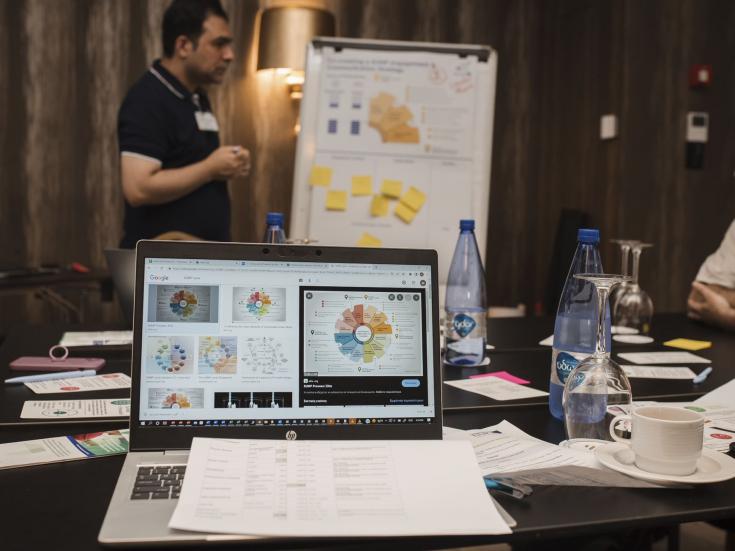Setting up regional funds with the European Investment Fund: key learnings

On 21 November 2023, the Policy Learning Platform hosted a webinar on setting up regional funds with the European Investment Fund. The webinar focused especially on innovative financial instruments such as equity (risk capital) and guarantee funds, aiming at boosting the economy through increasing the access to finance for enterprises and industry producing goods and services.
During the webinar, we got to learn from Jorge Sanz Gonzalez, Mandate Manager at Strategy & Business Development at EIF, about the opportunities offered in terms of investment in innovation and growth at the transnational, national and regional levels by the InvestEU Fund, the investment pillar of the InvestEU programme.
We also heard from the experiences from members of the Interreg Europe community. Virginie Nouvelle, Managing Director of Wallimage (ALICE) presented the case of a regional fund dedicated to the audiovisual sector in Wallonia (Belgium).
Inga Beiliūnienė, Member of the Management Board, Chief Business Development Officer at INVEGA (Innova-FI) reported from the transnational Baltic Innovation Fund.
Webinar recording
Watch the webinar recording below.
Webinar agenda
Navigate the agenda below to the topic of your interest.
The webinar has been designed and moderated by Luc Schmerber and Rene Tõnnisson Thematic Experts for Smarter Europe.
00:00:58: Introduction to the webinar and topic by Luc Schmerber and Rene Tõnnisson Thematic Experts for a Smarter Europe.
00:18:54: Keynote speech by Jorge Sanz Gonzalez, Mandate Manager at Strategy & Business Development at EIF, about the opportunities offered by the InvestEU Fund.
00:40:09: Q&A: Does the EIF also invest in regional public funds?
00:42:28: Q&A: What is the minimum of private participation?
00:44:29: Presentation by Virginie Nouvelle, Managing Director of Wallimage (ALICE) about a regional fund dedicated to the audiovisual sector in Wallonia (Belgium)
01:01:24: Q&A: Was there a state aid element in the instrument described by Virginie?
01:02:41: Q&A: How long was the process of getting the EIF? How many years it took and was it a complicated process?
01:05:37: Presentation by Inga Beiliūnienė, Member of the Management Board and Chief Business Development Officer at INVEGA (Innova-FI) about the transnational Baltic Innovation Fund.
01:17:05: Q&A: What are the typical, multiples or internal rate of returns or anything which you have already calculated for the first fund?
01:18:49: Q&A: How much of the total capital came from EIF and how much was from three Baltic countries? Was it more or less 50/50?
01:19:33: Q&A: How have you managed political interest from three countries considering that they are three different countries which all want to have their own piece of the cake? How has this process been managed to make sure that everybody is happy and you still have investment, not on the political criteria but on the market conditions?
Panel discussion
01:22:59: Q&A: What about intermediaries between EIF and SMEs? In Italy, this role is usually covered by the banks, which are often not the most suitable subjects (different language from that of an entrepreneur)
01:25:32: Q&A: Does InvestEU Fund take some special rights compared to other investors?
01:27:59 : Q&A: What is the average or typical negotiation process with a region or country?
01:30:32: Q&A: Does EIF support the process when people want to set up a transnational fund?
01:32:02: Q&A: If EIF is providing the money, what can the regions expect on top of it? Is EIF a smart money provider?
Key learnings
From this webinar, we can highlight some key insights:
The EIF's support is not just financial. The process of setting up a fund goes through several stages, including screening and due diligence by the EIF. Interaction with EIF experts helps investors improve their concepts. In some cases, such as the Baltic Innovation Fund, the EIF also provides operational management support.
The examples of Wallimage Entreprises and the Baltic Innovation Fund clearly show that EIF support helps to create funds targeting comparatively small investment markets - the audiovisual industry in Wallonia, start-ups in the Baltic countries. Financial support, combined with the reduction of risk for regional or national investors through risk-sharing, is key to leveraging significant amounts of private investment in new and innovative entrepreneurial ventures.
The experience of the Baltic Innovation Fund showed that it was possible for three countries (Estonia, Latvia and Lithuania) and the EIF to reach agreement on the terms of the Baltic Innovation Fund within three months.
While it may take longer than 3 months, a common understanding of objectives among investors makes the process much smoother than one might expect.
Funds should be managed by a professional organisation separate from the investors to avoid conflicts of interest and loss of focus on investment terms and conditions.
State aid rules exist to prevent unfair competition and distortion of the single market. Investment funds such as those supported by the EIF often operate under market conditions as far as the SMEs benefiting from the investment are concerned and therefore do not fall under State aid rules. The main purpose of EIF support is to reduce the risk for investors.
Presentations
Download the presentations below.